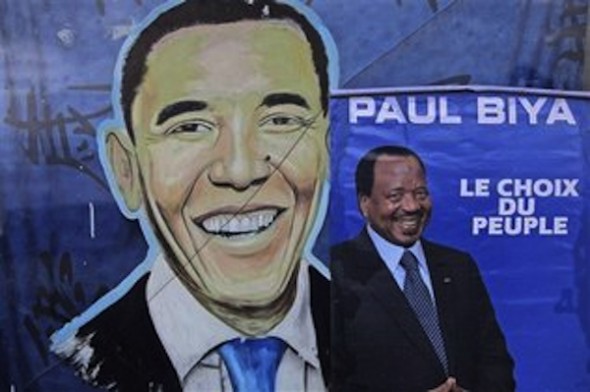
Yaounde, October 7, 2011. Photo: Sunday Alamba/AP
Do you know there’s a presidential election tomorrow (October 9th) in Cameroon?
Unless you’re Cameroonian or closely follow Cameroonian/African politics, you may not have heard anything about this election.
And yet…Paul Biya, president and favored presidential candidate, has been in office for nearly 30 years. That alone — in this year of massive political upheaval — would seemingly bring a bit more media attention to Cameroon’s upcoming election. If nothing else, one might ask why there’s no viable opposition in Cameroon and what this portends for the country’s future “stability” (“stability” being the grand achievement of Biya, who at 78, is not going to be around for much longer).
Named Prime Minister of Cameroon in 1975, Biya became President in November 1982 when Ahmadou Ahidjo resigned. He was not elected, but designated President and has been in office since.
In 2008, Biya pushed for an amendment of the 1996 constitution, which limited presidents to two seven-year terms in office. Despite massive protests that resulted in hundreds of deaths (never officially investigated), the constitution was amended, clearing the way for Biya to become president for life.
Biya regularly appears on the lists of Africa’s worst or world’s worst dictators (not that these lists really mean much, but appearing on one isn’t exactly an honor). Journalists who investigate too close to Biya and his inner circle are thrown in jail. Cameroonian journalist Bibi Ngota, denied medical care, died in prison while being held in pretrial detention in April 2010.
The late Pius Njawe, one of Africa’s greatest champions of press freedom, was arrested more than 100 times in his 30-year career. In December 1997, Njawe was imprisoned because his paper, Le Messager, printed an article that simply questioned Biya’s health. He spent nearly a year in prison before being released.
Singer Lapiro de Mbanga, who wrote a hit song critical of Biya’s constitutional maneuvers in 2008, was released from prison this April after three years behind bars. Writers are imprisoned; books are banned. Corruption is everywhere.
I could go on, but it ought to be clear that Biya is hardly an example of enlightened leadership. But apparently some dictators are more acceptable than others. What are we hearing from the White House or the Elysée Palace about Sunday’s elections?
Not much.
There are 23 candidates, including Biya, vying for office in a single-round election. Cameroon’s opposition is in tatters and it really wouldn’t make much difference if Biya were the only candidate on the ballot.
The supposedly independent electoral commission, ELECAM, is accused of being too close to Biya’s ruling party and just two days ago one of the key members, Pauline Biyong, was sacked for “gross negligence and violation of oath of office.” There have been problems with the delivery of voting cards. Funding for opposition candidates’ campaigns (approximately 45,000 Euros) was made available just a few days ago.
Artists and civil society activists are calling for a blank vote as a sign of protest.
French RFI has been covering the campaign and lead-up to the election and if you read French, the short RFI articles and podcasts are worth checking out.
The BBC has also given the campaign some attention.
An AP story from Yaounde has appeared in several U.S. publications today: Cameroon’s longtime strongman seeks another term.
We’ll see what happens tomorrow. At this point, there’s little doubt about the election outcome. What’s uncertain is how the people will react to it.
